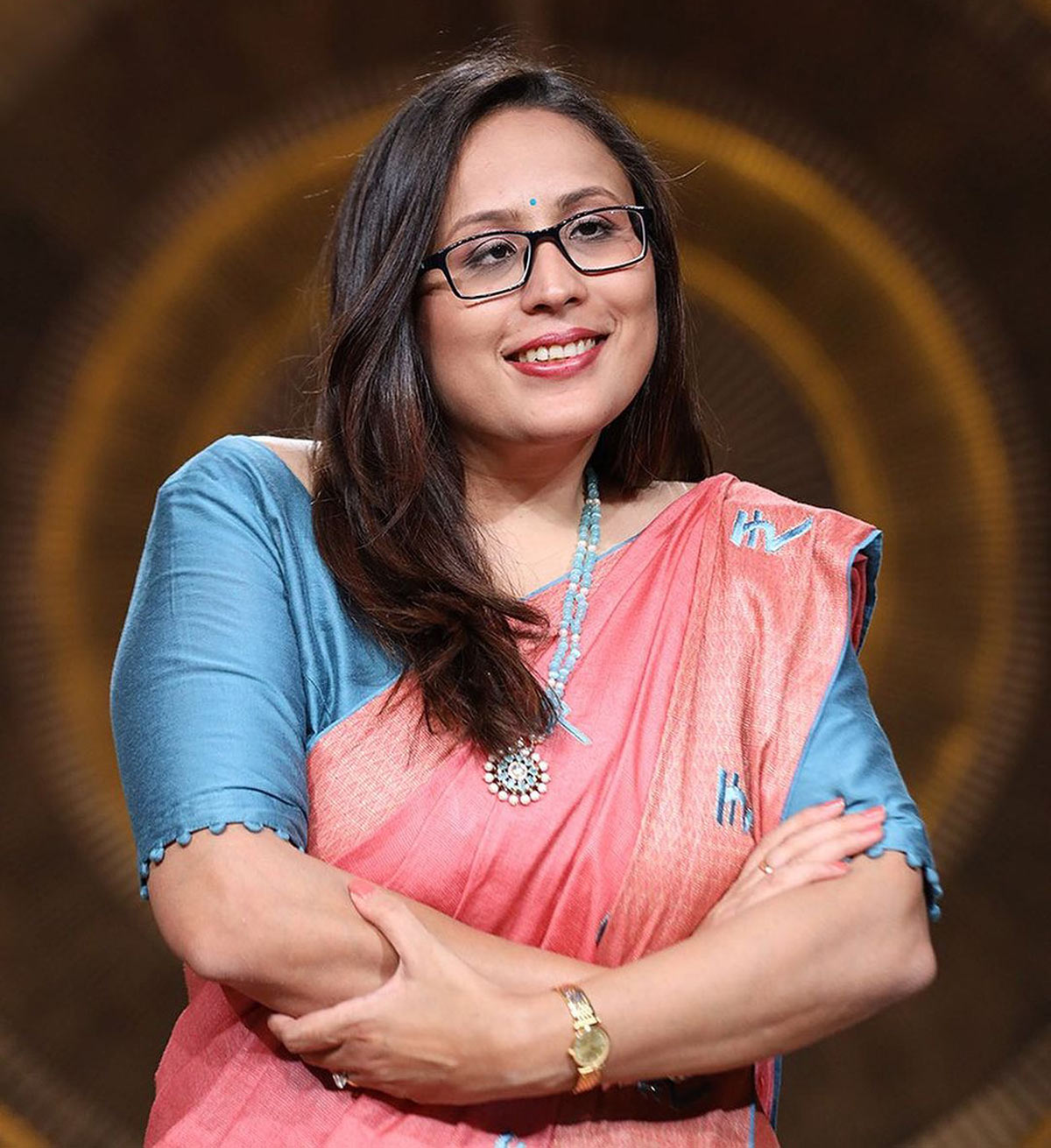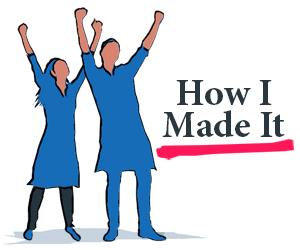'We all face challenges in life. It's our approach towards them that absolutely decides what you become.'

Radhika Gupta, the CEO of Edelweiss Mutual Fund, who returned to India from the US in 2009 and has since then never looked back, despite all the odds, tells Prasanna D Zore/Rediff.com about how she coped with challenges that life threw at her, how she handled failure and rejections, and what values helped her be the person that she is.
Calling herself 'the girl with a broken neck', Radhika, who was born in Pakistan -- her father was a diplomat and always on the move -- had the misfortune of being placed wrongly in the incubator by a nurse that led to a permanent tilt in her neck.
While she admits to being irritated initially by people asking her about her 'broken neck' and having gone through a phase where she didn't like the way she looked, Radhika found solace in academics and never let her disability hinder her growth as a human being and as a career professional.

How has been your journey since 2010? Has the decision to move to India paid rich dividends for you?
In retrospect, it is the finest decision I made.
What about the ups and downs you faced since 2010, the challenges, and how you overcame those challenges?
It's been a really long journey since then, but it's flown by as a breeze. I came back to India in 2009, turned entrepreneur, spent four or five years as an entrepreneur. It was a very rewarding experience, but it wasn't a very glamorous one.
To be an entrepreneur was not easy, as you remember. It was a tiny little office and we hardly had a team, so we were doing everything on own.
But we managed to bootstrap and build that business worth Rs 200-odd-crore, sold that business to Edelweiss in 2014 and joined the Edelweiss Group, became the CEO of the mutual fund in 2017, and then again started the journey of building the business, but this time a business that catered to retail investors all over the country, which is a journey in itself.
Looking back, was it a difficult -- some would even call it foolish decision -- to quit Wall Street and move to India to start up? How do you look back at those times and what do you tell yourself now about those?
I tell myself I was so brave. I wish I had such bravery now.

Why would you say that?
It was a very brave decision to give up a life that you had built so painstakingly, as a middle-class kid who had just made it, to come back to such an uncertain future in India. I think it was incredibly brave.
Being 23-24 and having that madness of youth enabled that kind of decision. But I tell myself it was brave. I'm an investment professional. I always say it's the best investment decision I made in my life to go long on India in 2009.
You've been a TEDX speaker as well, and you have given a TEDX talk about 'the girl with a broken neck'. Was this title given to you by somebody or was it you yourself who decided to call yourself 'the girl with a broken neck'? What kind of emotions do you go through when someone points out your physical disability?
I remember being very irritated about it as a child. At airports when these security ladies ask you, I remember just being like, 'Mind your own business. Why are you asking me and why are you pointing this out?'
Obviously, when the talk came, I was just debating what to title it, and this title kind of struck my head: 'The Girl With A Broken Neck.' And I felt it was right here. I just felt it was organically right. And I said, maybe it's time to just embrace all this.
Since then, I think my feelings about the neck are very different.
So when people would talk about the broken neck, what kind of emotions would you go through? Would you feel pity on the people or would you pity yourself?
I was just irritated. I was like, why do you have to point this out to me? Why do you have to make such a big deal about this? Why do you have to ask me this question? Before the talk, I think those were the emotions I used to go through.
There was a point in time in your life when you were contemplating even suicide. Could you tell our readers how did you cope with your failures, rejections and depression?
- I talk about this quite a bit in limitless fora, but just a few thoughts. One is, of course, we are not naturally tuned to talk about rejection. So my first tip is, honestly, have a conversation.
- Don't feel the need to grapple with things alone. People always tell you, be brave, have a conversation. Don't feel alone.
- Take time to process the sense of rejection and try to look at these things objectively.
- If one door closes, I genuinely believe another door opens, and in a country like India, that there are so many opportunities and there will be times when you will be rejected.
Did you ever go through a phase in your life where you told yourself, you won't be able to do much in life given your physical disability?
No, I don't think I went through a phase where I said this to myself but I went through a phase where I didn't like how I looked. Thankfully, I found my respite in academics.
In some sense, I was grateful because I was not very social. I spent so much time being a good student, and that was my sort of thing.
You are a mother now. Your child, Remy, is one. You recently celebrated his birthday. What lessons have you been learning after becoming a mother? What kind of career and life lessons life lessons have you learned along the way?
Being a mother is just pure, unalloyed joy. I think the biggest thing I've learned is that before I became a mother, people scared me a lot about being a mom-CEO and saying, 'kaise hoga, kaise hoga?' (how will you cope with the responsibilities of being a mother and CEO?)
And I've learned that it's all possible. I have learned that while it's chaotic and there's a lot of planning, everything can happen, and you should believe it is possible and it will become possible.

Tell us about your career and life lessons.
I think prioritisation has been the biggest one.
I was always a very good time manager, but after a child, I think I have a much sharper sense of priorities. I think that's really the biggest one. I evaluate everything, and I've learned to say no a lot more.
What attitude and approach do you adopt to overcome personal and professional challenges?
We all face challenges in life. It's our approach towards them that absolutely decides what you become.
Professionally, the challenge always is raising money; I think being in the client business the challenge is winning over trust of people.
I've learned that a certain amount of honesty is extremely important, especially when you make mistakes, because we all make mistakes. That's one thing I learned. What else strikes me as important? I think building a brand is a difficult exercise in India.
What I've learned is to be hands on, to be on the ground, and to really give things time, because you don't get the answers on day one, you don't win people over on day one. So just building and taking time, I think that's been a lesson.
I think resilience has been an important lesson; as financial services professional you naturally go through so many ups and downs.
Having a certain amount of resilience helps, I think, has also been a lesson.
What values did your parents inculcate in you as a child?
The biggest one was being more than your circumstances, working hard, believing that each generation should take a leap. My father is still the hardest working person in our house. He's 70 plus. The second one -- because of our unique background in moving around -- is being very adaptable, not holding on to something and moving on quickly.
The third one was finding optimism, making the best of the opportunities that are given to you, the circumstances that you are in.
What are the motivations in your life? When you are down, when you face challenges, what motivates you the most?
I think the ability to make impact. There is no greater joy.
I'll tell you a story.
I was once traveling with a group of other CEOs, many of them much more senior, richer, etc. And a couple of people came to me at the airport and took pictures with me and said that something I had said or written had sort of changed the way they looked at their own profession and their own career. And everyone looked at me and asked why have these people come to you? And I said, I must have written something.
That gives me great sense of joy. It's a joy that money or power can't buy: The ability to make an impact on people's lives.

What's your advice for India's youth, especially those who want to become entrepreneurs?
I think go for it, but be fully informed about what you are trying to do. Entrepreneurship is not glamorous, it's not glorious. It has really dark and tough days.
It requires a lot of resilience. So go for it. It's the best thing you can do. But do it thoughtfully and for the right reason.
I must ask you this question because I've been doing some background research. Tell us about your love for Urdu and Hindi poetry. How did your journey with poetry begin?
Since a child I loved poetry. We grew up with Hindi and Urdu in our house because my father had lived in Pakistan. He is, of course, an exceptionally good writer himself.
We grew up with an environment that was rooted in poetry to be honest. It's always been in the house; we listen to ghazals. In fact, because I grew up abroad, I didn't learn Hindi. I only studied Hindi for three, four years in school.All my Hindi is learned from poetry.
Who are your favourite poets?
I like Faiz (Ahmed Faiz). I love Sahir Ludhianvi's work.
![]()






 © 2025
© 2025